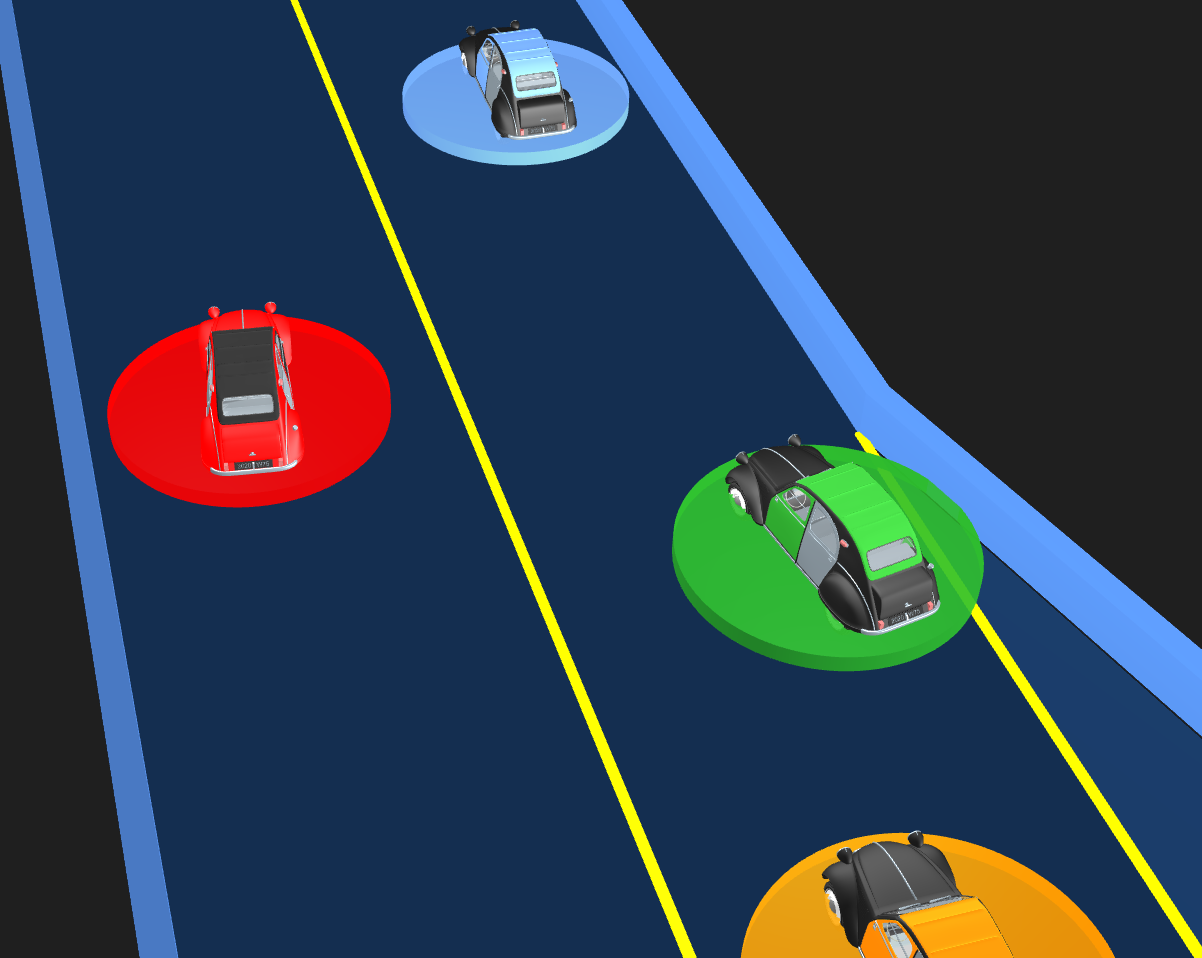
Game Theoretic Planning for Autonomous Driving
We developed fast solver for constrained dynamic games and applied it to complex autonomous driving scenarios. The autonomous driving vehicle and the cars in its surroundings are agents participating in a game. Each vehicle has its own objective: reach a desired speed, drive on a certain lane etc. Additionally, the agents must respect constraints: avoiding collisions with other vehicles, respecting speed limits etc. The planner in the autonomous driving car solves this constrained game for a Nash equilibrium solution. This allows the autonomous driving vehicle to plan for itself and predict the trajectories of the cars in its surroundings jointly. We control the autonomous vehicle by executing this planner in a receding horizon loop at frequencies larger than 70 Hz. This model predictive control planner generates complex driving behaviors where vehicles negotiate and share the responsibility for avoiding collisions.
Related Publications:
- S. Le Cleac’h, M. Schwager, and Z. Manchester, “ALGAMES: A Fast Augmented Lagrangian Solver for Constrained Dynamic Games,” Autonomous Robots, 2021. [pdf] [bibtex]
- S. Le Cleac’h, M. Schwager, and Z. Manchester, “LUCIDGames: Online Unscented Inverse Dynamic Games for Adaptive Trajectory Prediction and Planning,” IEEE Robotics and Automation Letters, vol. 6, no. 3, pp. 5485–5492, 2021. [pdf] [bibtex]
- M. Wang, Z. Wang, J. Talbot, J. C. Gerdes, and M. Schwager, “Game-Theoretic Planning for Self-Driving Cars in Multivehicle Competitive Scenarios,” IEEE Transactions on Robotics, 2021. [pdf] [bibtex]
- Z. Wang, R. Spica, and M. Schwager, “Game Theoretic Motion Planning for Multi-robot Racing,” in Distributed Autonomous Robotic Systems, 2020, vol. 9, pp. 225–238. [pdf] [bibtex]
- G. Notomista, M. Wang, M. Schwager, and M. Egerstedt, “Enhancing Game-Theoretic Autonomous Car Racing Using Control Barrier Functions,” in 2020 IEEE International Conference on Robotics and Automation (ICRA), June 2020, p. 7. [pdf] [bibtex]
- M. Wang, N. Mehr, A. Gaidon, and M. Schwager, “Game-Theoretic Planning for Risk-Aware Interactive Agents,” in 2020 IEEE/RSJ International Conference on Intelligent Robots and Systems (IROS), Oct. 2020, pp. 6998–7005. [pdf] [bibtex]
- S. Le Cleac’h, M. Schwager, and Z. Manchester, “ALGAMES: A Fast Solver for Constrained Dynamic Games,” in Robotics: Science and Systems XVI, July 2020. [pdf] [bibtex]
- R. Madaan, N. Gyde, S. Vemprala, M. Brown, K. Nagami, T. Taubner, E. Cristofalo, D. Scaramuzza, M. Schwager, and A. Kapoor, “AirSim Drone Racing Lab,” in Proceedings of the NeurIPS 2019 Competition and Demonstration Track, Dec. 2020, vol. 123, pp. 177–191. [pdf] [bibtex]
- Z. Wang, T. Taubner, and M. Schwager, “Multi-agent sensitivity enhanced iterative best response: A real-time game theoretic planner for drone racing in 3D environments,” Robotics and Autonomous Systems, vol. 125, p. 103410, Mar. 2020. [pdf] [bibtex]
- M. Wang, Z. Wang, J. Talbot, J. Christian Gerdes, and M. Schwager, “Game Theoretic Planning for Self-Driving Cars in Competitive Scenarios,” in Robotics: Science and Systems XV, June 2019. [pdf] [bibtex]